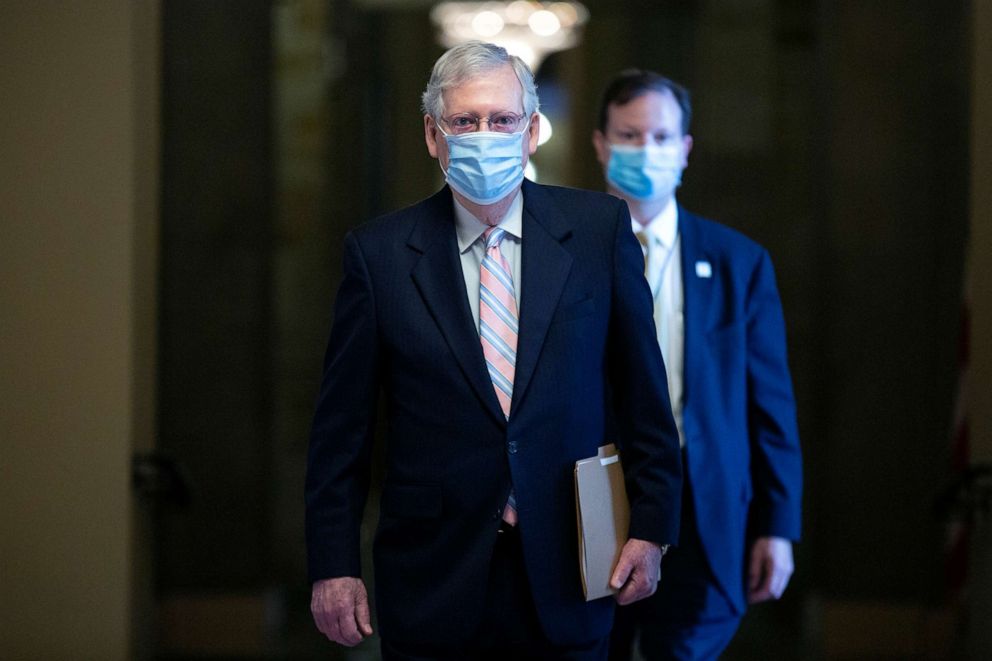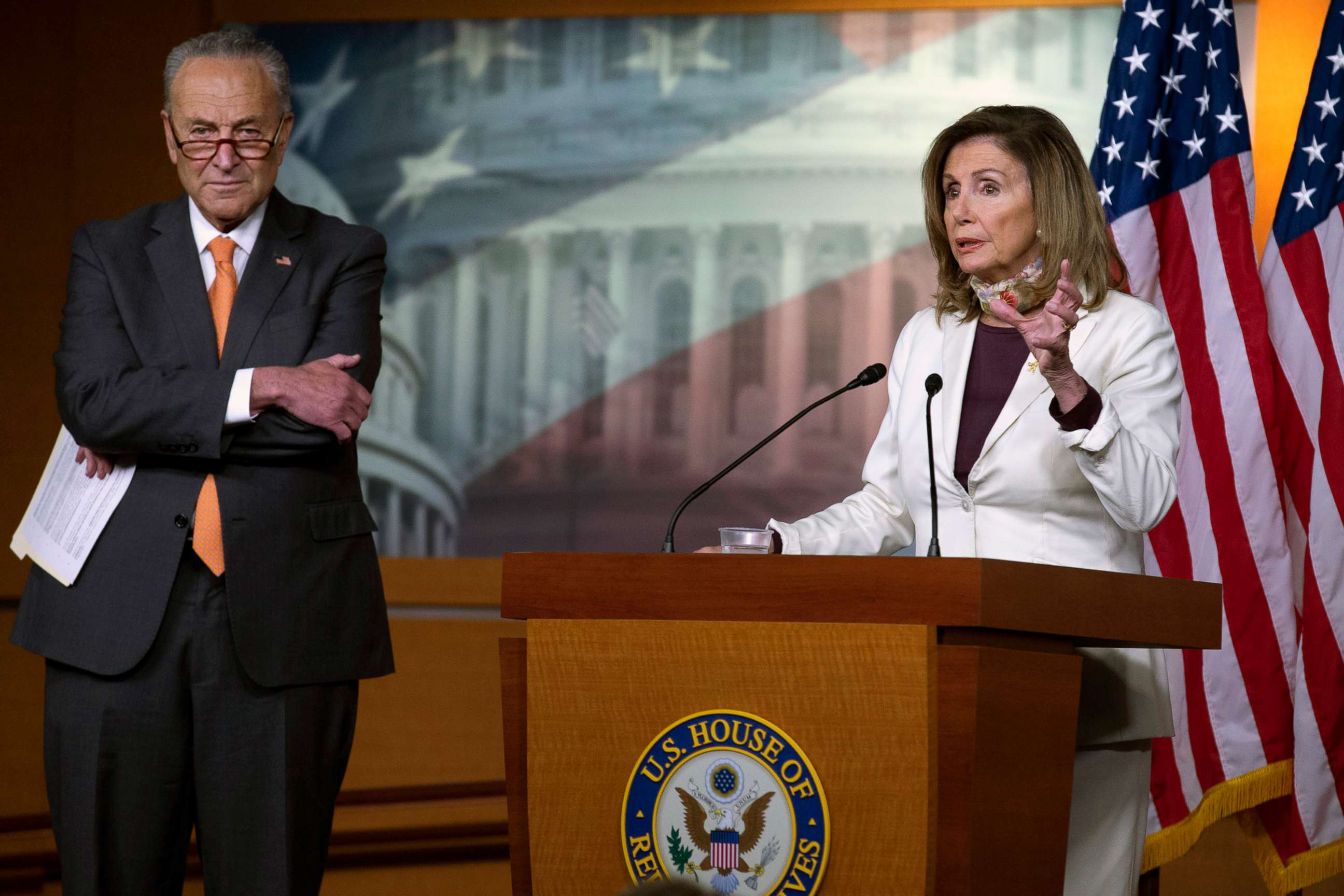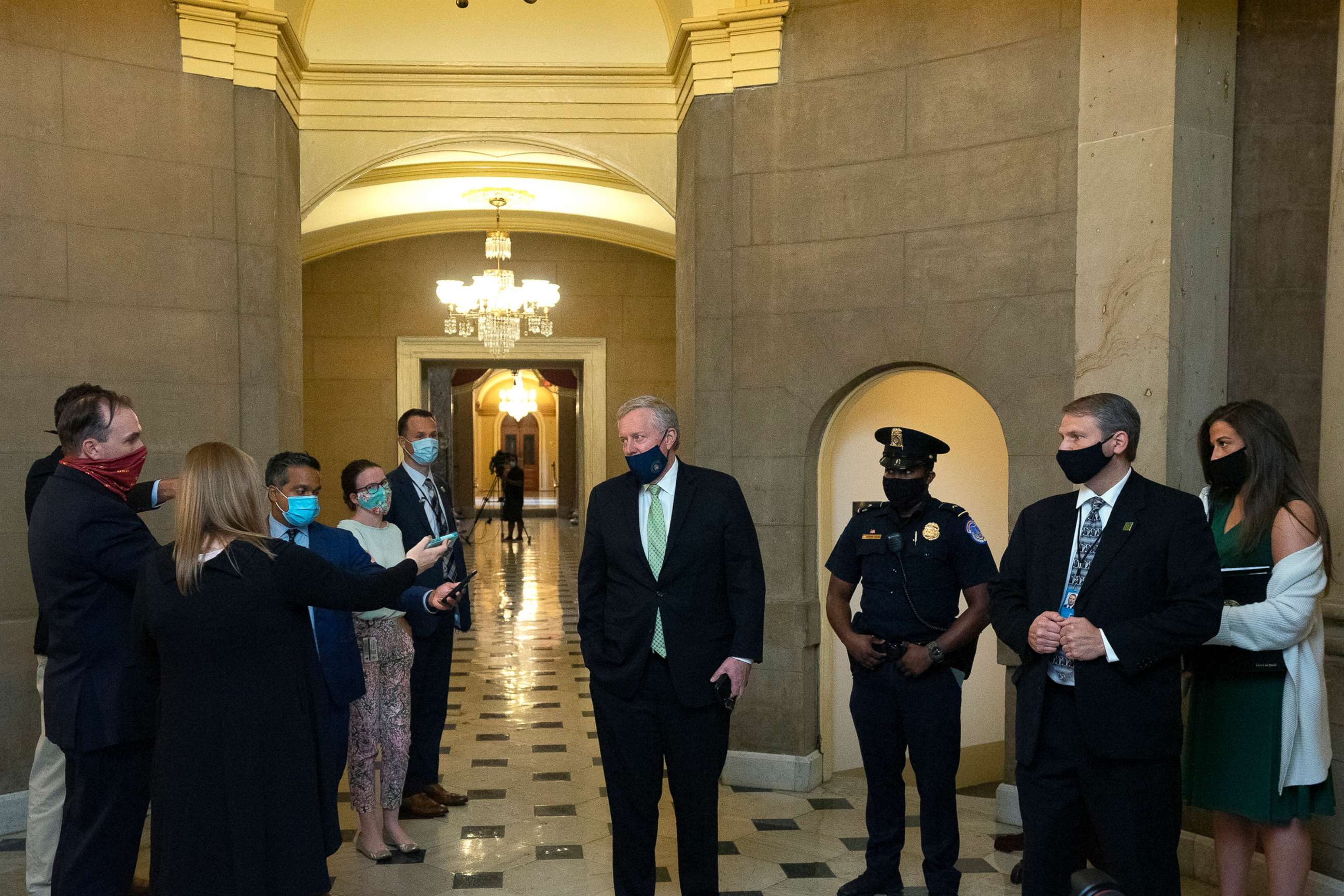Negotiations on brink of collapse with no clear path forward on coronavirus relief
Friday is the self-imposed deadline for an agreement to be reached.
Conversations between administration officials and Democratic congressional leaders about coronavirus relief may soon fall apart, with both parties leaving the Capitol on Thursday evening claiming to be "very far apart" on key issues.
Now, as the clock ticks down on the self-imposed Friday deadline for an agreement, negotiations between the two parties appear to be on the brink of collapse.
"The American public wants action, so again, we're not going to just keep on coming back every day if we can't get to a deal," Treasury Secretary Steve Mnuchin said. "We've said by the end of the week we wanted to reach an agreement on the major issues."
But agreement does not appear within close reach. Thursday evening's negotiations ended with House Speaker Nancy Pelosi calling the administration's offer a "Sophie's choice."
Pelosi and Senate Minority Leader Chuck Schumer have argued that the "slimmed down" approach taken by Republicans does not do enough to address the widespread issues of the pandemic.
"When they said a skinny proposal, it was anorexic," Pelosi said.

White House Chief of Staff Mark Meadows said that President Donald Trump called him three different times during the meeting. While the president continues to advocate for a congressional solution, he is now seriously considering what he can do, Meadows said.
"He is prepared to take executive action on his own," if an agreement is not reached Meadows said.
And Trump similarly teased that such an order could be coming down the pike.
"Probably tomorrow afternoon" or the next morning, Trump said Thursday, when asked about a possible executive order, though he did note that there was still time for a congressional agreement to come to fruition.
Sen. John Kennedy, R-La., said he backs executive action.
"If Congress isn't going to do its job, then I think the president needs to act," he said
But some members expressed unease at the legality of such a move. It's unclear if the president would be moving unspent money from other locations, and that always causes Congress -- which is supposed to control the purse strings -- a bit of heart burn.
Sen. John Cornyn, R-Texas, told reporters, "I don't know what his authority would be or even what he could do but, they're clearly looking at that."
Still, frustration fully set in on Capitol Hill Thursday as senators headed off on something of an August recess. The Senate did not formally adjourn, but members have been told they'll get a 24-hour notice to return to the Capitol for a vote on a deal if one can be reached.
"The Senate won't adjourn for August unless and until the Democrats demonstrate they will never let an agreement materialize," Senate Majority Leader Mitch McConnell said.
Republican Senators on Thursday blamed Pelosi and Schumer for the ongoing stalemate.

"I have no problem staying if there's a reason to stay. But Speaker Pelosi and Sen. Schumer have to give us a reason to stay, and I'm convinced they don't want to do that. Why? I don't know," said Kennedy.
The approaching 2020 election has also led some Republicans to speculate about Democrats' motivation.
Sen. Marco Rubio, R-Fla., warned, "As long as they calculate that they're better off politically doing nothing, it's going to be hard for us to move forward and that's the calculation they've made, it appears."
While the Senate squabbles, Americans who depend on the benefits created by the last relief bill face losing assistance. The $600 unemployment benefit and moratorium on evictions has already expired. And this week marks the end of the period to apply for the paycheck protection program, an initiative which Sen. Susan Collins, R-Maine, championed.
Collins lamented the time lost on negotiations on Thursday, but held out hope of a deal.
"I'm very concerned that it's taking so long, and it seems to me that there should have been a deal this week but obviously there wasn't. Um, I don't know," said Sen. Collins. "At this point it's hard to predict when, but I still think it's going to come together over the weekend, and we'll be back voting on it next week."
The two sides appear to still be light years apart though. Democrats have argued a robust bill is needed to address the litany of economic and health stressors caused by the pandemic.
"The Trump administration and Senate Republicans have badly mauled the body politic, the American economy and American health care and we believe the patient needs a major operation while Republicans want to apply just a Band-Aid," Schumer said.
One Democrat in perhaps the toughest reelection this fall, Sen. Doug Jones of Alabama, laid into Republicans who refused to negotiate for several months while they determined the effectiveness of the previous tranche of federal emergency pandemic spending, saying, "They push you up against the wall and then say its your fault. ... Maybe we should change tradition. I mean that's an absurd way to run this country -- under threats."
Moreover, a number of Republicans said they're highly skeptical of any deal between Democratic leaders and the administration, some planning to vote against whatever comes out -- others saying they're just not sure a majority of the GOP conference would support such an agreement in the end, something that McConnell has forecasted.

"There will be a Republican split anywhere from liking maybe the content but not the price tag, and you'll see a broad array of different Republican votes," Sen. Mike Braun, R-Ind., told reporters. "I'm guessing it'll pass would be my prediction -- I think if the White House gets behind it. ... I'm gonna be looking at the content, but I'm guessing the top line will probably make it hard for me to vote for it."
For his part, McConnell sought to reassure the country that a deal would eventually make it across the finish line, saying in a CNBC interview, "I'm not going to speculate about the timing, but what I do want to reassure the American people is that there is a desire on the part of both the Democrats and the Republicans -- at least most of the Republicans, not every single one -- that want an outcome, because the economy does need an additional boost until we get the vaccine. Exactly when a deal comes together, I couldn't tell you, but I think it will at some point in the near future."
Asked earlier Thursday if Democrats might change their position and support a short-term extension of some expired programs, like the expanded federal pandemic unemployment benefits -- that $600 per week paycheck that ended last weekend, Pelosi minced no words, saying, "We're not having a short term extension."
This report was featured in the Friday, Aug. 7, 2020, episode of “Start Here,” ABC News’ daily news podcast.
"Start Here" offers a straightforward look at the day's top stories in 20 minutes. Listen for free every weekday on Apple Podcasts, Google Podcasts, Spotify, the ABC News app or wherever you get your podcasts.
What to know about the coronavirus:
- How it started and how to protect yourself: Coronavirus explained
- What to do if you have symptoms: Coronavirus symptoms
- Tracking the spread in the U.S. and worldwide: Coronavirus map
Tune into ABC at 1 p.m. ET and ABC News Live at 4 p.m. ET every weekday for special coverage of the novel coronavirus with the full ABC News team, including the latest news, context and analysis.




